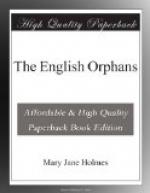Among the first to call upon them was Mrs. Perkins who came early in the morning, bringing her knitting work and staying all day. She had taken to dressmaking, she said, and thought may-be she could get some new ideas from Mary’s dresses, which she very coolly asked to see. With the utmost good humor, Mary opened her entire wardrobe to the inspection of the widow, who, having recently forsaken the Unitarian faith, and gone over to the new Methodist church in River street, turned conscientiously away from the gay party dresses, wondering how sensible people, to say nothing of Christian people, could find pleasure in such vanities!
“But then,” said she, “I hear you’ve joined the Episcopals, and that accounts for it, for they allow of most any thing, and in my opinion ain’t a whit better than the Catholics.”
“Why, we are Catholic. Ain’t you?” asked Mary.
The knitting work dropped, and with a short ejaculatory
prayer of
“Good Lord,” Mrs. Perkins exclaimed, “Well,
I’m glad you’ve owned up.
Half on ’em deny it,—but there ’tis
in black and white in the Prayer
Book, ‘I believe in the Holy Catholic Church.’”
It was in vain that Mary referred her to the Dictionary for a definition of the word ‘Catholic.’ She knew all she wanted to know, and she shouldn’t wonder, bein’ ’twas Friday, if Miss Mason didn’t have no meat for dinner.
The appearance of a nicely roasted bit of veal quieted her fears on that subject, and as the effects of the strong green tea became apparent, she said, “like enough she’d been too hard on the Episcopals, for to tell the truth, she never felt so solemn in her life as she did the time she went to one of their meetins’; but,” she added, “I do object to them two gowns, and I can’t help it!”
At last the day was over, and with it the visit of the widow, who had gathered enough gossiping materials to last her until the Monday following, when the arrival in the neighborhood of George Moreland, threw her upon a fresh theme, causing her to wonder “if ’twan’t Mary’s beau, and if he hadn’t been kinder courtin’ her ever since the time he visited her school.”
She felt sure of it when, towards evening, she saw them enter the school-house, and nothing but the presence of a visitor prevented her from stealing across the road, and listening under the window. She would undoubtedly have been highly edified, could she have heard their conversation. The interest which George had felt in Mary when a little child, was greatly increased when he visited her school in Rice Corner, and saw how much she was improved in her manners and appearance; and it was then that he conceived the idea of educating her, determining to marry her if she proved to be all he hoped she would.




